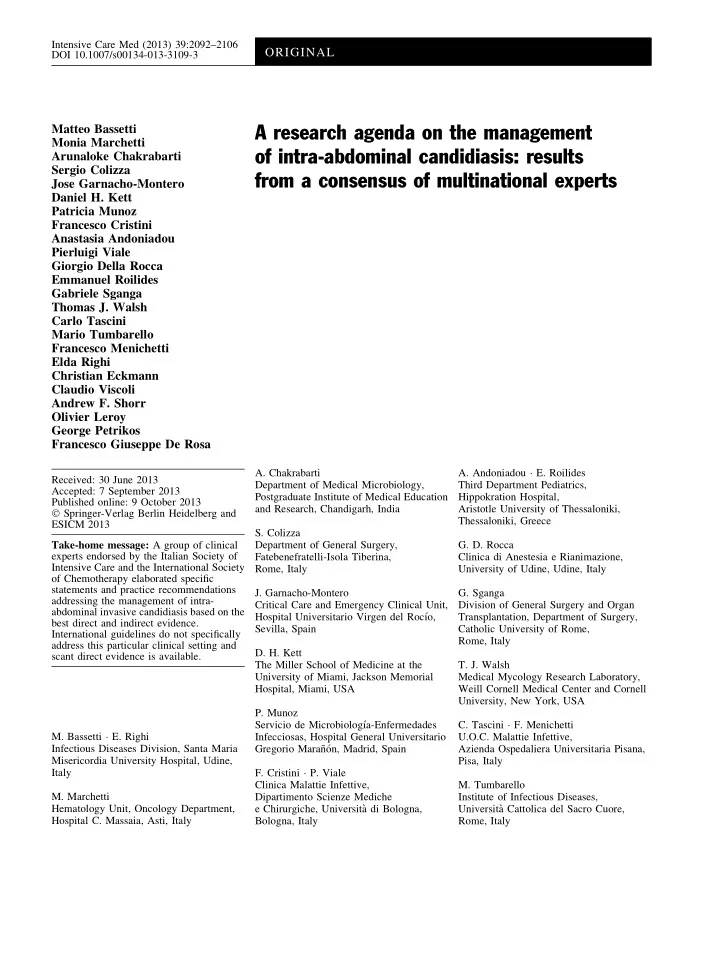

Intensive Care Med (2013) 39:2092–2106 ORIGINAL DOI 10.1007/s00134-013-3109-3 Matteo Bassetti A research agenda on the management Monia Marchetti of intra-abdominal candidiasis: results Arunaloke Chakrabarti Sergio Colizza from a consensus of multinational experts Jose Garnacho-Montero Daniel H. Kett Patricia Munoz Francesco Cristini Anastasia Andoniadou Pierluigi Viale Giorgio Della Rocca Emmanuel Roilides Gabriele Sganga Thomas J. Walsh Carlo Tascini Mario Tumbarello Francesco Menichetti Elda Righi Christian Eckmann Claudio Viscoli Andrew F. Shorr Olivier Leroy George Petrikos Francesco Giuseppe De Rosa A. Chakrabarti A. Andoniadou � E. Roilides Received: 30 June 2013 Department of Medical Microbiology, Third Department Pediatrics, Accepted: 7 September 2013 Postgraduate Institute of Medical Education Hippokration Hospital, Published online: 9 October 2013 and Research, Chandigarh, India Aristotle University of Thessaloniki, � Springer-Verlag Berlin Heidelberg and Thessaloniki, Greece ESICM 2013 S. Colizza Take-home message: A group of clinical Department of General Surgery, G. D. Rocca experts endorsed by the Italian Society of Fatebenefratelli-Isola Tiberina, Clinica di Anestesia e Rianimazione, Intensive Care and the International Society Rome, Italy University of Udine, Udine, Italy of Chemotherapy elaborated specific statements and practice recommendations J. Garnacho-Montero G. Sganga addressing the management of intra- Critical Care and Emergency Clinical Unit, Division of General Surgery and Organ abdominal invasive candidiasis based on the Hospital Universitario Virgen del Rocı ´o, Transplantation, Department of Surgery, best direct and indirect evidence. Sevilla, Spain Catholic University of Rome, International guidelines do not specifically Rome, Italy address this particular clinical setting and D. H. Kett scant direct evidence is available. The Miller School of Medicine at the T. J. Walsh University of Miami, Jackson Memorial Medical Mycology Research Laboratory, Hospital, Miami, USA Weill Cornell Medical Center and Cornell University, New York, USA P. Munoz Servicio de Microbiologı ´a-Enfermedades C. Tascini � F. Menichetti M. Bassetti � E. Righi Infecciosas, Hospital General Universitario U.O.C. Malattie Infettive, Infectious Diseases Division, Santa Maria Gregorio Maran ˜o ´n, Madrid, Spain Azienda Ospedaliera Universitaria Pisana, Misericordia University Hospital, Udine, Pisa, Italy Italy F. Cristini � P. Viale Clinica Malattie Infettive, M. Tumbarello M. Marchetti Dipartimento Scienze Mediche Institute of Infectious Diseases, ` di Bologna, ` Cattolica del Sacro Cuore, Hematology Unit, Oncology Department, e Chirurgiche, Universita Universita Hospital C. Massaia, Asti, Italy Bologna, Italy Rome, Italy
2093 C. Eckmann nonspecific risk factors, a positive Abstract Introduction: intra- Department of General, Visceral and mannan/antimannan or (1 ? 3)- b - D - abdominal candidiasis (IAC) may Thoracic Surgery, Klinikum Peine glucan (BDG) or polymerase chain include Candida involvement of peri- Academic Hospital of Medical University reaction (PCR) test result should be toneum or intra-abdominal abscess and Hannover, Hannover, Germany present to start empirical therapy. is burdened by high morbidity and Fluconazole can be adopted for the mortality rates in surgical patients. C. Viscoli empirical and targeted therapy of non- Infectious Disease Clinic, Unfortunately, international guidelines San Martino Hospital, critically ill patients without previous do not specifically address this partic- University of Genoa, exposure to azoles unless they are ular clinical setting due to Genoa, Italy known to be colonized with a Candida heterogeneity of definitions and scant strain with reduced susceptibility to direct evidence. In order to cover this A. F. Shorr azoles. Treatment can be simplified by unmet clinical need, the Italian Society Pulmonary and Critical Care Medicine stepping down to an azole (fluconaz- of Intensive Care and the International Division, Washington Hospital Center, ole or voriconazole) after at least Washington, DC, USA Society of Chemotherapy endorsed a 5–7 days of treatment with echino- project aimed at producing practice O. Leroy candins or lipid formulations of recommendations for the management Service de Re ´animation et Maladies amphotericin B, if the species is sus- of immune-competent adult patients Infectieuses, Centre Hospitalier Chatiliez, ceptible and the patient has clinically with IAC. Methods: A multidisci- Tourcoing, France improved. Conclusions: Specific plinary expert panel of 22 members recommendations were elaborated on (surgeons, infectious disease and G. Petrikos IAC management based on the best Fourth Department of Internal Medicine, intensive care physicians) was con- School of Medicine, National and direct and indirect evidence and on the vened and assisted by a methodologist Kapodistrian University of Athens, expertise of a multinational panel. between April 2012 and May 2013. Athens, Greece Evidence supporting each statement Keywords Candida � was graded according to the European F. G. De Rosa Abdominal infections � Consensus Society of Clinical Microbiology and Department of Medical Sciences, Infection Diseases (ESCMID) grading Infectious Diseases Clinic at Amedeo di Abbreviations Savoia Hospital, University of Turin, system. Results: Only a few of the Turin, Italy numerous recommendations can be SITI Italian Society of summarized in the Abstract. Direct Intensive Care M. Bassetti ( ) ) microscopy examination for yeast ISC International Society Infectious Disease Division, detection from purulent and necrotic Azienda Ospedaliera Universitaria Santa of Chemotherapy intra-abdominal specimens during Maria della Misericordia, Piazzale Santa ESCMID European Society of surgery or by percutaneous aspiration Maria della Misericordia 15, Clinical Microbiology 33100 Udine, Italy is recommended in all patients with and Infectious Diseases e-mail: mattba@tin.it nonappendicular abdominal infec- EP Expert panel Tel.: ? 39-0432-559355 tions including secondary and tertiary GI Gastrointestinal Fax: ? 39-0432-559360 peritonitis. Samples obtained from IAC intra-abdominal drainage tubes are not valuable except candidiasis for evaluation of colonization. Pro- ICU Intensive care unit phylactic usage of fluconazole should CLSI Clinical and Laboratory be adopted in patients with recent Standards Institute abdominal surgery and recurrent gas- EUCAST European Committee on trointestinal perforation or Antimicrobial anastomotic leakage. Empirical anti- Susceptibility Testing fungal treatment with echinocandins CAGTA C. albicans germ tube or lipid formulations of amphoteri- antibodies cin B should be strongly considered in BDG (1 ? 3)- b - D -Glucan critically ill patients or those with IDSA Infectious Diseases previous exposure to azoles and sus- Society of America pected intra-abdominal infection with CNS Central nervous system at least one specific risk factor for Candida infection. In patients with
Recommend
More recommend